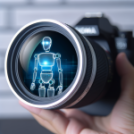As Artificial Intelligence (AI) continues to evolve, it’s creating substantial impact across various sectors. Digital Marketing is among those sectors, where AI automation tools are transforming traditional methods. Harnessing this technology is fostering efficiencies, enhancing personalization, and optimizing return on investments (ROI). This article will delve into leveraging AI automation in digital marketing, the associated benefits, and effective implementation strategies.
Strategic Utilization of AI Automation Tools in Digital Marketing
AI automation tools, when strategically deployed, can revolutionize the marketing domain. These tools enable marketers to automate repetitive tasks, delve into consumer behavior, and gain valuable insights into market trends.
Chatbots, for example, are AI-based software designed to interact with humans in their natural language. These tools can be used on websites, applications, and social platforms, enhancing customer service while freeing up human resources for other tasks.
Likewise, AI-powered content creation tools can leverage customer data to generate personalized content, capturing the audience’s interest more effectively than generic content.
The Benefits of Using AI Automation in Digital Marketing
AI automation ushers in myriad benefits. By taking over repetitive tasks, AI allows marketing teams to focus on strategic, creative tasks, effectively boosting productivity.
Accuracy in targeting is another significant benefit. AI can analyze vast amounts of user data to identify patterns, which can then be used to more accurately target potential customers.
AI technology also excels at personalization. By analyzing customer behavior and preferences, the technology can personalize websites, emails, content, and ads, substantially improving user experience and engagement.
Furthermore, it’s a cost-effective solution that can improve ROI with advanced analytics, predictive analysis, and improved customer interactions.
Effective Implementation of AI Automation into Digital Marketing Workflows
The first step in implementing AI automation is to define key business objectives and identify areas where AI can generate value. Businesses should then investigate the market for tools that align with their requirements.
Next, integrating the chosen AI tool into existing workflows can begin, but it’s crucial to do so incrementally, testing every integration stage to ensure compatibility with the workflow and achieving the desired outcome.
Training staff on how to use the new systems is a crucial implementation step that should not be overlooked. Without this, the potential benefits of the AI tool might not be fully realized.
Lastly, implementation should involve consistently monitoring and refining the AI tool to ensure it’s delivering tangible results and improved ROI.
In conclusion, AI automation stands to revolutionize traditional digital marketing methods. Through strategic utilization, efficiencies are created, accuracy in targeting is improved, personalization is enhanced, and ROI can see a significant increase. With detailed and intentional implementation, businesses can stay competitive in the ever-changing digital marketing landscape. Embracing AI automation is no longer optional; it’s now imperative for a successful digital marketing strategy.










